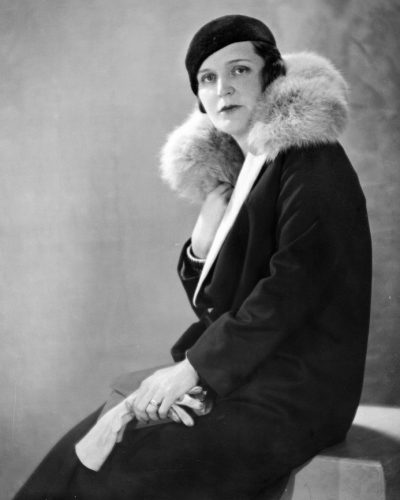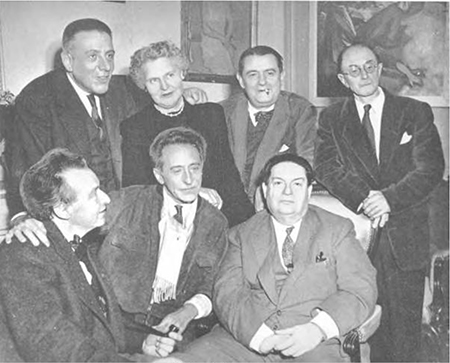By Daniel Hathaway
. Two lunchtime concerts & piano duos at Beachland Ballroom
. Almanac: remembering Germaine Tailleferre, who is easy to recognize in photos of Les Six, the group of French & Swiss composers based in Montparnasse who represented a neo-classical protest against both Wagnerism and impressionism.
Can you match names to faces? Pictured with Tailleferre are Georges Auric (1899–1983), Louis Durey (1888–1979), Arthur Honegger (1892–1955), Darius Milhaud (1892–1974), and Francis Poulenc (1899–1963). Photo from the Cleveland Memory Project donated by Katharine Warne.
HAPPENING TODAY:
12:00 pm – BrownBag Concerts: Bach Fest. Zhan Shu, violin (D minor Partita) Todd Wilson, organ (Prelude and Fugue in f, BWV 534. Trinity Cathedral, 2230 Euclid Ave. Cleveland. Free.
12:00 pm – Chamber Music in the Atrium Lunchtime Concert featuring students from the Cleveland Institute of Music: Manuel Lok, & Yuwa Roten, violins, Aubrey Williamson, viola, Aria Posner, cello, & Madelin Wilks & Alton French, bassoons. Cleveland Museum of Art, 11150 East Blvd, Cleveland. Free.
7:30 pm – Cleveland International Piano Competition 2023 Listening Series: It’s a Spring Thing, with Christine Lamprea, cello and Yaron Kohlberg, piano. Dive into the world of the piano as a musical partner. Learn how a pianist works with string players to create a unified sound, blending artistic sensibilities to build a cohesive musical performance. Beachland Ballroom, 15711 Waterloo Rd, Cleveland. Click here for tickets.
TODAY’S ALMANAC:
By Jarrett Hoffman

And third, an underrecognized Parisian composer on whom we’ll train our focus today. Born on this date in 1892 in Saint-Maur-des-Fossés, southeast of the City of Light, Germaine Tailleferre was the only female member of the post-World War I group of composers known as Les Six. Her varied output included operas, ballets, film music, concertos, songs, and orchestral and chamber music.
One of the best ways to celebrate her career is by listening to her Le marchand d’oiseaux. Full of fresh-flavored neoclassicism, it’s no wonder that it was the Ballet Suédois’ most frequently performed ballet in the 1920s. A performance led by Perry So (with perhaps the BBC Welsh National Orchestra, as one commenter suggests) is available on YouTube.
Another highlight is her impressionistic and deeply atmospheric Ballade for piano and orchestra, heard here in a recording by the Deutsche Radio Philharmonie Saarbrücken Kaiserslautern, led by Pablo González and featuring Florian Uhlig as soloist.
It’s also important to understand how sexism obstructed Tailleferre’s career and legacy, a topic that Timothy Diovanni (now an arts writer for Dallas Morning News) explored in two articles written for Women’s Philharmonic Advocacy in 2017.
In the first essay, Diovanni delves into the men in her personal life who impeded her artistic progress: her discouraging, hostile, and verbally abusive father, as well as her two husbands, whose behavior ranged from jealous to controlling, threatening, and violent.
The second covers the ways that critics and historians have described her work — often dismissively, using gender-coded language, and training their focus on her appearance rather than her music.
In history, it’s very easy to oversimplify the lives of the characters who appear along the way, so that they barely seem like real people at all. Indeed, many well-regarded encyclopedias do just that with their short and useful summaries that, in the end, leave out so much about a person’s life. On that note, Diovanni makes an important point near the conclusion of his first article:
Tailleferre is not just an eleven-letter name in a music history textbook, but rather she was a real, living woman who had to negotiate social pressures and overcome tremendous injustices.




